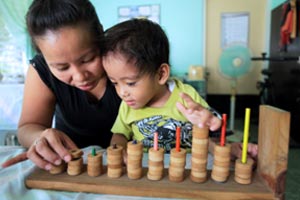Your progress
0%
Here are some of the key ideas about CBR and early childhood care and education.
Use your mouse or keyboard to expand each of the headings below.
Early childhood sets the foundations for life. CBR personnel will observe that there are different understandings about a child’s early years, depending on local traditions, faiths/religions, cultures, family structures and the way primary schooling is organized. It is important to acknowledge and value this diversity.
Child development is a learning process that every child goes through to enable him or her to master important skills and developmental milestones for life. Major areas of child development include:
Social and emotional development, such as smiling or making eye contact
Cognitive (learning) development, such as using hands and eyes to explore the environment and do simple tasks
Speech and language development, such as communicating with words or signs
Physical development, such as sitting, standing, walking, running and being able to use hands and fingers to pick things up or to draw
Developmental milestones are skills that a child will acquire in a specific order and time frame. One example of a milestone is that children will typically learn to walk between the ages of nine and 15 months. ”Developmental delay” is a term used when a child does not reach milestones appropriate for his or her age. It can occur in one or more of the development areas listed above. If developmental delay is identified early in a child’s life, measures can be taken to provide learning opportunities and an environment that will help address the delay.
CBR personnel are encouraged to focus on the strengths of the child with a disability. It is important that they do not place too much emphasis on developmental milestones for children with disabilities, as problems may arise if they are used too rigidly.
The concept of developmental delay is based on the average performance for an age group or we call “normal”. Therefore this comparison can lead to labelling and stigmatization.
Children with disabilities do not necessarily follow a “normal” pattern of development. However, this will not stop them from leading full and happy lives, it is fundamentally important that they are included and supported throughout their developmental years.
The milestones are general principles and, in reality, there is a lot of variation depending on culture, gender, ethnicity and social and economic circumstances.
A child’s development is influenced by many factors, including health, nutrition, care and education.

Young children learn naturally and effectively through play and by taking part in everyday activities. Activity-based learning can be an effective alternative approach in situations where resources and time are limited. Activity-based learning refers to how children learn when they are physically involved in activities that are useful or productive. These include self-care activities, such as washing, dressing, eating and helping with domestic or other work. Stimulation is about providing an environment and activities that stimulate the child’s development.
It is important that CBR personnel understand the following points.
Play or activity-based learning are important for young children, and particularly children with disabilities. It helps them to develop daily living skills and can reduce the impact of their impairment.
Play can be structured or unstructured (free play), and can be initiated by the child or with adult support.
For children with severe impairments, play and stimulation activities are particularly important. While it may be difficult to see signs of learning, it does not mean that the children are not receiving any benefit.
Parents may carry out too many stimulation activities with their children, particularly when there are excessive social pressures to achieve “normal development” and academic success. This pressuring restricts children’s opportunities for play and can be harmful to their social and emotional development.
Each child, family, community and culture is different. Formal settings such as preschools will suit some children and not others. CBR can support families to make informed choices about support and environments, and to respond flexibly. When doing so, CBR should also prioritize making existing early childhood education provisions inclusive.
CBR can work with families to ensure that their choices are not based on shame or overprotection, but reflect the best interests of the child. These choices also need to respect the various rights of the child, such as the right to stay within his/her own family and community.
Learn about how a community in Mexico established inclusive early education programmes.


In a region of Mexico near Culiacan, indigenous families move down from their mountain villages for four months of the year and stay in barracks provided by the agricultural factories where they work. CBR negotiated with the factory owners to set up Early Education Centres in each building, and obtained permission for mothers to take part along with their disabled children in early intervention sessions twice a month. With support from the CBR personnel, the day centres in the factories included children four years and older. Families of children with disabilities are now returning every year to the same area to get good care for their children and learn how to help them to develop in their early years. They take the knowledge back to their villages, where they can teach other families.